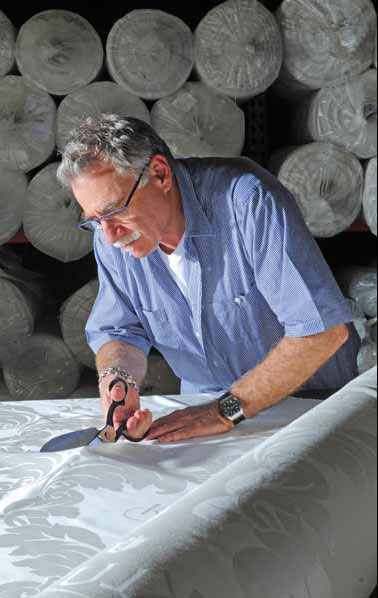An American's cushy venture
Updated: 2012-06-01 07:55
By Ariel Tung (China Daily)
|
||||||||
|
Earl Kluft handcrafting a mattress at his factory in California. Provided to China Daily |
Californian Bets high-end mattresses to attract affluent buyers
For the wealthy, luxury can mean having a comfortable bed that costs as much as $50,000.
Earl Kluft, owner of E.S. Kluft & Co, is targeting China's growing pool of super-rich to buy his high-end mattresses.
Soon after he set up a plant in Rancho Cucamonga, California, in 2004 to manufacture luxury beds, Kluft began to think about selling to China. Last September, he opened three retail stores, Aireloom by Kluft, in Shanghai and Beijing to sell his US-made mattresses priced between $3,500 and $50,000.
Kluft's mattresses stand out from ordinary ones because they are made by hand. One mattress takes three days to make from high-end materials such as cashmere, mohair, Joma wool and Talalay latex, and is checked for "comfort, support, pressure relief and durability".
Although the average Chinese are unable to afford a Kluft mattress, the number of wealthy people in China will give him "more than enough business".
"There are 1 million millionaires in China. I will have more than enough business if I sell to China's millionaires alone," says Kluft.
A Boston Consulting Group survey indicates that the number of millionaire households in China ranks third in the world, behind the 5.22 million in the United States and Japan's 1.53 million.
While the Chinese mainland has close to a million millionaires with personal wealth of 10 million yuan ($1.58 million, 1.25 million euros) or more, this number is increasing almost 10 percent annually, according to the GroupM Knowledge-Hurun Wealth Report 2011.
Kluft's partner, Eternal Sleep, a Chinese mattress maker, helps promote his business in China and runs the Shanghai and Beijing stores.
Kluft's Aireloom mattresses are advertised in China Eastern Airlines' in-flight magazine.
Kluft first went to China in 2005 looking for business opportunities. Through a mutual friend, he was introduced to Bao Zhao, who became the entrepreneur's agent in China.
With the help of Bao, Kluft entered into a partnership with Eternal Sleep to sell his mattresses in China.
Although the market for luxury bedding in China is still in its infancy, Kluft wants to establish his company's brand name early. Chinese consumers tend to place prestige on Western brands and products made overseas.
"Chinese consumers are very careful when it comes to making purchases. They are not afraid to spend the money but they want good quality. They want to buy top-notch brands," Kluft says.
Kluft envisions expanding his retail chain into major first- and second-tier Chinese cities including Shenzhen, Guangzhou, Shenyang and Chongqing.
"The Chinese demand for American-made luxury products is on the rise," he says.
His confidence is backed by research that forecasts China will overtake Japan as the world's largest luxury market by 2015. Consumption of luxury items in China will grow by 18 percent annually to about $27 billion by 2015, according to consulting company McKinsey & Co.
Global luxury-goods manufacturers are clearly wooing Chinese buyers, with some increasingly tailoring products to the Chinese market.
The French luxury giant Hermes has opened a boutique in Shanghai for its new Chinese brand, Shang Xia.
BMW launched a China-only limited version of its MS model for the 2010 Chinese New Year.
Kluft learned that Chinese consumers have different tastes when it comes to mattresses.
The older Chinese people prefer firmer and thinner mattresses, although the younger ones "like them the way we make them in the US".
So now Kluft's factories in the US - a 127,000-square-foot factory in Rancho Cucamonga and an East Coast facility in Pennsylvania's Lancaster County - have begun producing mattresses tailored for the Chinese market.
The most expensive mattress he's selling in China (featuring 2,000 steel coils and 10 pounds of wool including cashmere and mohair) costs $50,000. It's not available to the US market.
Chinese consumers also have to pay more for the mattresses after factoring in freight costs and import duties. But Kluft has no plan to build a plant in China. His reason: Chinese consumers favor products made in the US.
"The Chinese consumers want them made in America. They don't want them made in China," Kluft says.
On the other hand, Kluft and his partner Eternal Sleep are planning to start another business - supplying mattresses to high-end hotels in China. He may set up factories in China to produce these mattresses.
"It just won't be cost-effective to ship mattresses from the US to the hotels in China," Kluft says.
E.S. Kluft revenue has increased by 14 times over the past five years - from $3.5 million in 2006 to $50 million in 2011. Just a small fraction of that comes from exports, but Kluft expects sales to China to grow significantly in years to come.
atung@chinadailyusa.com
(China Daily 06/01/2012 page17)

 Relief reaches isolated village
Relief reaches isolated village
 Rainfall poses new threats to quake-hit region
Rainfall poses new threats to quake-hit region
 Funerals begin for Boston bombing victims
Funerals begin for Boston bombing victims
 Quake takeaway from China's Air Force
Quake takeaway from China's Air Force
 Obama celebrates young inventors at science fair
Obama celebrates young inventors at science fair
 Earth Day marked around the world
Earth Day marked around the world
 Volunteer team helping students find sense of normalcy
Volunteer team helping students find sense of normalcy
 Ethnic groups quick to join rescue efforts
Ethnic groups quick to join rescue efforts
Most Viewed
Editor's Picks

|

|

|

|

|

|
Today's Top News
Chinese fleet drives out Japan's boats from Diaoyu
Health new priority for quake zone
Inspired by Guan, more Chinese pick up golf
Russia criticizes US reports on human rights
China, ROK criticize visits to shrine
Sino-US shared interests emphasized
China 'aims to share its dream with world'
Chinese president appoints 5 new ambassadors
US Weekly

|

|







